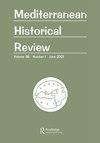The inland seas: towards an ecohistory of the Mediterranean and the Black Sea
IF 0.2
2区 历史学
Q1 HISTORY
引用次数: 9
Abstract
War was “remarkably consistent” appears to rest on a downplaying of the very real fears that Churchill expressed in 1937/8 about the dangers of a Nationalist victory for Britain’s imperial interests. Britain also looms large in the background of Pedro Aires Oliveira’s chapter on Portugal, in which he notes that – for all his instinctive support for Franco and hostility to the Second Republic – Salazar was essentially a defender of the status quo, and saw the alliance with Britain as crucial to maintaining Portugal’s independence. By contrast, Spanish Falangists were far less judicious in their relationship with Nazism. Xosé M. Núñez Seixas’ chapter charts the rise of Germanophilia on the Spanish right throughout the 1930s, an admiration that reached its peak with Hitler’s invasion of the Soviet Union in 1941. Even those who were not outright Fascists saw the Third Reich in 1940/41 as the key to not only defeating Communism but also to breaking the power of the old imperialist enemy – the United Kingdom. The book concentrates on the Civil War’s political and international ramifications and gives little coverage to its impact on intellectuals. However, a fascinating chapter by Silvina Schammah Gesser and Alexandra Chevela Dergacheva on the poet Rafael Alberti goes some way to making up for this omission. Alberti, working closely with his partner Maria Teresa León, emerged during the Civil War as a key defender of the Republic in intellectual circles, and was a strong supporter of the Soviet Union, which by that time was, of course, the Republic’s only substantial source of weapons. The chapter focuses on Alberti and León’s visit to Moscow in March 1937 and their two-hour meeting with Stalin who, according to León, looked “thin and sad”. No record of the meeting survives beyond an official communiqué in which Alberti gushed about Stalin’s kindness and deep interest in Spanish affairs. However, it seems likely that Alberti conducted some secret diplomacy during his visit, presumably encouraging the Soviets to send a delegation to the forthcoming International Congress of Antifascist Writers in Valencia. The authors point out that in later life Alberti (who lived until 1999) was rather successful at presenting himself as merely a naive “engagé”, infatuated with the Soviet Union, and reticent to confront the true extent of his “Soviet past and connections” in public. In this case, at least, it seems that history really had stopped in 1936.内陆海:走向地中海和黑海的生态历史
战争“非常一致”,似乎是基于对丘吉尔在1937/8年表达的非常真实的担忧的淡化,即民族主义胜利对英国帝国利益的危险。在佩德罗·艾利斯·奥利维拉(Pedro Aires Oliveira)关于葡萄牙的章节中,英国也显得举足轻重,他在章节中指出,尽管萨拉查本能地支持佛朗哥并敌视第二共和国,但他本质上是现状的捍卫者,并认为与英国的联盟对维持葡萄牙独立至关重要。相比之下,西班牙法兰哲主义者在与纳粹主义的关系上远没有那么明智。XoséM.Núñez Seixas的这一章描绘了整个20世纪30年代西班牙右翼对日耳曼人的崇拜,这种崇拜在1941年希特勒入侵苏联时达到了顶峰。即使是那些不是彻头彻尾的法西斯分子,也认为1940/41年的第三帝国不仅是击败共产主义的关键,也是打破帝国主义宿敌英国力量的关键。这本书专注于内战的政治和国际影响,几乎没有报道它对知识分子的影响。然而,Silvina Schammah Gesser和Alexandra Chevela Dergacheva关于诗人Rafael Alberti的精彩章节在一定程度上弥补了这一遗漏。阿尔贝蒂与他的伙伴玛丽亚·特蕾莎·莱昂密切合作,在内战期间成为知识界共和国的关键捍卫者,也是苏联的坚定支持者,当然,当时苏联是共和国唯一的重要武器来源。这一章的重点是阿尔伯蒂和莱昂1937年3月对莫斯科的访问,以及他们与斯大林的两个小时的会面,据莱昂说,斯大林看起来“又瘦又悲伤”。除了官方公报之外,没有任何会议记录,阿尔贝蒂在公报中滔滔不绝地谈到斯大林的善良和对西班牙事务的深切兴趣。然而,阿尔贝蒂在访问期间似乎进行了一些秘密外交,大概是鼓励苏联派代表团参加即将在巴伦西亚举行的国际反法西斯作家大会。作者指出,阿尔贝蒂(活到1999年)在晚年相当成功地将自己描绘成一个天真的“工程师”,迷恋苏联,不愿在公开场合面对他“苏联的过去和关系”的真实程度。至少在这种情况下,历史似乎真的在1936年停止了。
本文章由计算机程序翻译,如有差异,请以英文原文为准。
求助全文
约1分钟内获得全文
求助全文

 求助内容:
求助内容: 应助结果提醒方式:
应助结果提醒方式:


